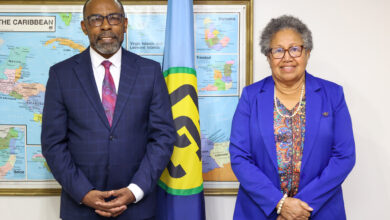(CARICOM Secretariat, Turkeyen, Greater Georgetown, Guyana) In its quest to eradicate poverty, the Caribbean Region must reorient its fiscal systems as well as move its production systems away from preferential treatment.
This was the view articulated by The Right Hon. Owen Arthur, Prime Minister of Barbados, in his keynote address at the opening of the Conference on the Caribbean on 19 June 2007 at the Preston Hall, World Bank, Washington DC.
The change in the status of preferential arrangements, he said, was the greatest manifestation of the changes circumstances within which the Region was operating.
He told the opening plenary that Caribbean Community (CARICOM) Heads of Government had journeyed to the United States in the belief that the Conference on the Caribbean would mark the beginning of a fresh, more productive phase in relations between CARICOM and the US.
The Barbados Prime Minister, who has lead responsibility for the CARICOM Single Market and Economy (CSME), referred to the harshness of the global environment that made Caribbean growth and development a challenge. Those challenges, he said, were made more complex by security and environmental threats, among others.
As an alternative to protection, a new enterprise culture must be created and sustained in order to boost competition. In addition, he stressed, the State should not retreat, but become more entrepreneurial.
Itemising essential steps the Region must take to eradicate poverty and unemployment, the Prime Minister said the Region must stay the course of restructuring; engage in creative development diplomacy and enhance the process of sustainable relations through the CSME.
The other keynote speaker at the opening plenary was US Secretary of Commerce, Carlos Gutierrez who also underscored the need for the Region to create a stronger climate within which businesses can develop and strive.
He referred to the vibrant and vital relationship between CARICOM and the US as well as the shared challenges of countries in the hemisphere.




